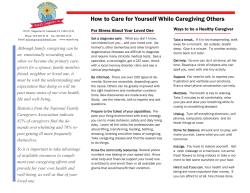
& Social Workers Caregivers S
& Social Workers Caregivers A team that helps and cares S ocial workers often work directly with caregivers. They may help your family member or friend in a hospital, or in a home care program. As well, social workers are often employed in • rehabilitation programs • family service centres • community centres • mental health and addiction services • employee assistance programs, and • the justice system or children and youth services. Social workers may work with other health care professionals such as respite centre staff, occupational therapists, speech therapists, psychologists, physiotherapists, doctors, nurses, dieticians and pharmacists. What social workers are saying about YOU “ We know the care recipients do better when they have family support.” “ A support system is so very important, and so when we’re talking about families, we’re talking about the non-professional, the non-paid caregivers, and thank goodness for them. They make a difference.” What social workers know about caregivers • Caregivers provide frequent, ongoing support for someone with a health care need. • You may be looking after a spouse, parent, grandparent, child, grandchild, or friend who has physical or developmental problems. • You may have quit your job or changed your work hours so you can offer care. You may have to travel to arrange care. You may need money or other support to help with your own finances. • As the person you are caring for becomes less able to do dayto-day tasks, you may have to take on more. This may mean you are responsible for the family budget, banking, home maintenance, and all parenting (such as driving children to sports or other programs). The work cannot be shared anymore. • Sometimes caregivers act as chauffeurs and therapists (doing physiotherapy at home). At the same time, they are expected to provide emotional support to their family member or friend. • Some caregivers call by telephone to offer support from far away. Others live with the person that needs care. In both cases, the caregiver can suffer from caregiver stress. • Caregivers are a key part of Canada’s economy, because they step in and help for free. What you can do Have one point of contact within your family. This will help to improve communication with the social worker (and avoid confusion). Go into appointments with your family member or friend. Listen to what is being said so you can help them remember later. Make a list of questions and take it with you to all appointments. Check off items as they are discussed. Do not feel shy about asking questions, even if you start with, “I’m not quite sure about…” Set aside time to have a good discussion with the social worker. Know and ask as much as you can about the health of your family member or friend. Ensure that you are updated. Find out how many hours of help from the social worker are offered through your program or plan. Knowing how long you can work with the social worker can help both of you focus on meeting your goals. Taking care of yourself is important. Building in time for yourself helps you have more energy and strength to care for others. Don’t be shy. Ask for help. Deal with problems right away and do not feel guilty about needing help – it’s a natural part of caregiving. Quote from a social worker “ Right from the start, don’t be a hero, because we know that this caregiving is hard work in many ways. Be very clear that you need help, and be clear about which areas. ” Social workers offer support that caregivers need Social workers can work in many roles. They may be a counsellor, case manager, educator, or advisor. They can act on behalf of your family member or friend (as an advocate) and they can help other people on the health care team work well together (facilitator). They can help you Social workers can also • Explore your needs and options so you can make good choices for yourself and for the person you are caring for. • Communicate with others on your behalf, or help you get in touch with groups such as those working on Alzheimer’s, arthritis, or cancer. • Find a respite or support group for yourself. • Learn how to access programs (such as getting your family member or friend into a nursing home or setting up drivers, meals, or housekeeping services). • Find your way through systems and processes (such as the health care system, government financial aid like compassion benefits, suitable housing, transportation, and other fees and costs). • Balance the roles and needs of other family members when the needs of the person you are caring for change over time. • Help you connect with other health care professionals (such as physiotherapists, occupational therapists, etc.). • Link you to people who supply home health equipment, personal support, and professional services. • Connect you to resources for power of attorney, wills, other legal services. • Counsel families to help them cope with illness, injury, or disability. • Work with you to plan ahead. They can help you predict what caring for your family member or friend will involve both in the short-term (feeling grief if the illness or health problem is sudden) and long-term (role changes, loss of independence, steps to take before and after death, grief after death). • Give advice for different stages of care and prepare you for the shift from helping someone in the hospital, to helping them at home, to long-term care. This article was produced thanks to funding from the Ontario Ministry of Health and Long-Term Care. The views expressed in the article do not necessarily represent the views of the Ontario Ministry of Health and Long-Term Care .
© Copyright 2025





















